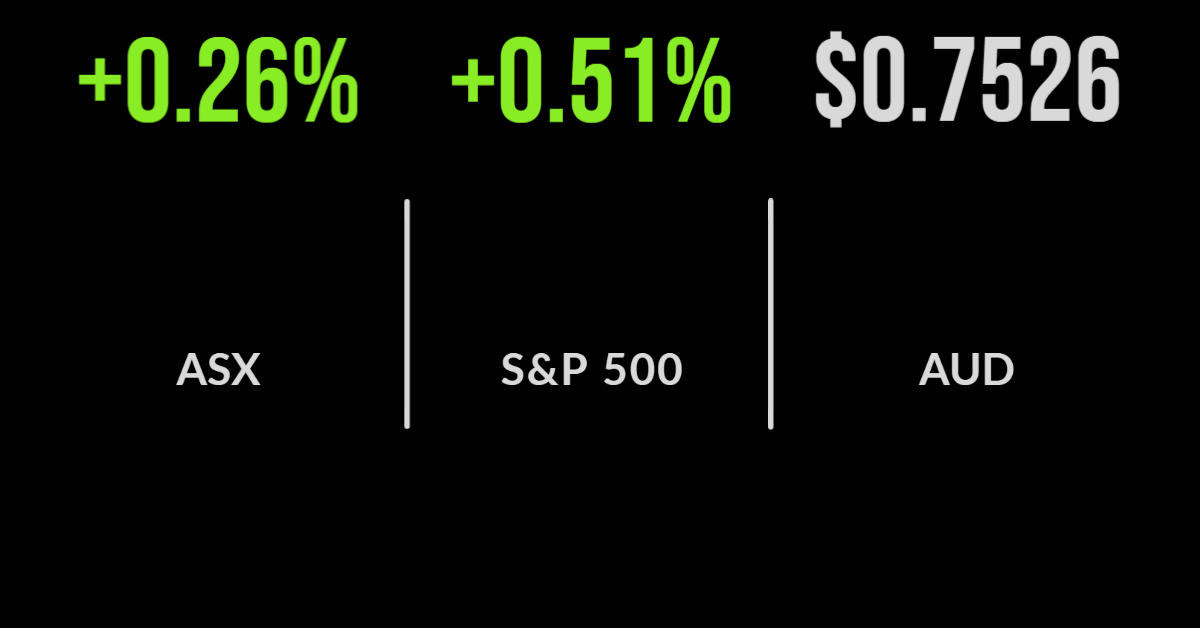ASX hits two month high, Premier disappoints, healthcare under pressure
The Australian market remains resilient to the threat of higher energy prices with the S&P/ASX200 gaining another 0.3 per cent to finish the week.
The result was driven by a rally in the energy, materials and utilities sectors, which gained 0.9, 1.3 and 1 per cent respectively.
Investors are clearly flocking to perceived inflation hedges with the market finishing up 1.5 per cent for the week and touching a two-month high.
Healthcare remains severely challenged as Telix (ASX: TLX) fell another 11 per cent, finishing the week off 17.6 per cent.
It was all about the retailers and commodity producers, on Friday, with JB HiFi (ASX: JBH) gaining another 3.6 per cent and Flight Centre (ASX: FLT) increasing by the same amount.
In company-specific news, Premier Investments (ASX: PMV) fell 1.5 per cent after disappointing investors with their latest quarterly update.
The group, which owns Smiggle and Peter Alexander, reported global sales growth of just 0.6 per cent, but like for like sales growth of 8.9 per cent suggesting new store openings aren’t having the same impact.
Some 42,675 trading days were missed during the half, with gross profile increasing just 1.7 per cent as a result, but up 10 per cent on 2020.
Online sales hit a record of $195 million and the company delivered their highest interim dividend ever.
Over the week it was a similar story to Friday, with the energy, materials and utilities sectors all gaining more than 5 per cent as the energy price remains high, with healthcare underperforming, down 2.5 per cent.
US markets closed mixed, but another positive week, IT, Alibaba fall, NIO upgrades
US markets finished the same way they started, in a broadly positive fashion despite no signs of the oil price rally slowing down.
Bond yields continue to rally putting pressure on lower-quality companies across most growth sectors, sending the Nasdaq to a 0.2 per cent loss but a 2 per cent gain for the week.
The world’s largest global technology companies continue to rally, Apple (NYSE: APPL) up 0.4 per cent taking the short rally over 15 per cent.
The S&P500 outperformed, gaining 0.5 per cent and 1.8 per cent for the week, with the market overcoming news that the European Council had agreed on a Digital Markets Act aimed at reining in the power of the technology giants.
Oil futures remain elevated after a major Saudi processing plant was attacked overnight, the Dow gained 0.4 per cent and 0.3 per cent for the week.
Volatility in Chinese stocks continued, with JD.com down 2.6 per cent after the US accounting board indicated there was some way to go before they would sign an agreement allowing the transparency into Chinese audit reports of dual-listed companies.
Shares in EV maker NIO fell close to 10 per cent despite posting better than expected revenue in the fourth quarter, with weaker guidance the driver.
Australian and US rates is different, retailer proves strategy wins, everything is in flux
The Federal Reserve has naturally been garnering all the attention lately with their perceived fight against inflation, for better or worse, drawing headlines following an initial rate hike this month.
Fed officials have been clear in highlighting they don’t believe rate hikes will fix the entire problem but rather stop the economy from overheating further.
Despite these rate hikes, the Australian government bond yield remains higher than the US.
Interestingly, Australia’s reliance on variable rate mortgages compared to the more common fixed-rate in the US, means cash rate changes have significantly more impact at home.
News this week that JB HiFi (ASX: JBH) continues to be a category killer will come as a surprise for many.
The entry of Amazon (NYSE: AMZN) some years ago into the Australian market was expected to all but kill the margins of the business, yet through quality management and strategy, JB has not only survived but thrived, delivering solid sales growth and reaching an all-time high this week.
Finally, if we didn’t need the reminder, everything we know is currently in flux.
Markets have all but overcome the initial impact of the invasion of Ukraine, technology companies and healthcare are falling, but commodities are rising.
Iron ore prices are rallying despite Chinese lockdowns, and bond yields have spiked ahead of our peers where cash rates are actually moving higher.
There is no set strategy to guide portfolios in this environment, but diversification remains key.








